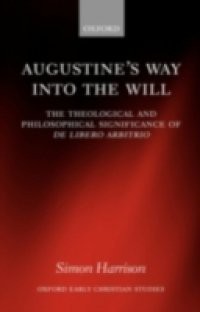Augustine's dialogue De libero arbitrio (On Free Choice) is, with his Confessions and City of God, one of his most important and widely read works. It contains one of the earliest accounts of the concept of 'free will' in the history of philosophy. Composed during a key period in Augustine's early career, between his conversion to Christianity and his ordination as a bishop, it has often been viewed as a an incoherent mixture of his 'early'and 'late' thinking. Simon Harrison offers an original account of Augustine's theory of will, taking seriously both the philosophical arguments and literary form of the text. Relating De libero arbitrio to other key texts of Augustine's, in particular the City of God and the Confessions, Harrison shows that Augustineapproaches the problem of free will as a problem of knowledge: how do I know that I am free?, and that Augustine uses the dialogue form to instantiate his 'way into the will'.

